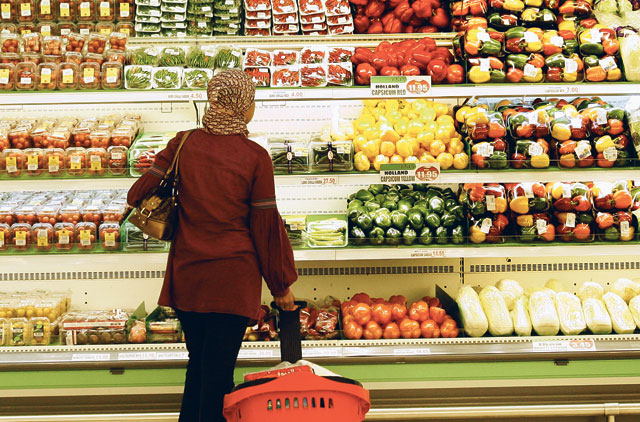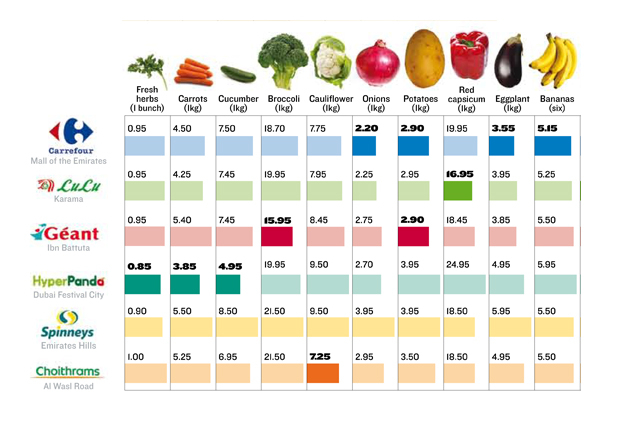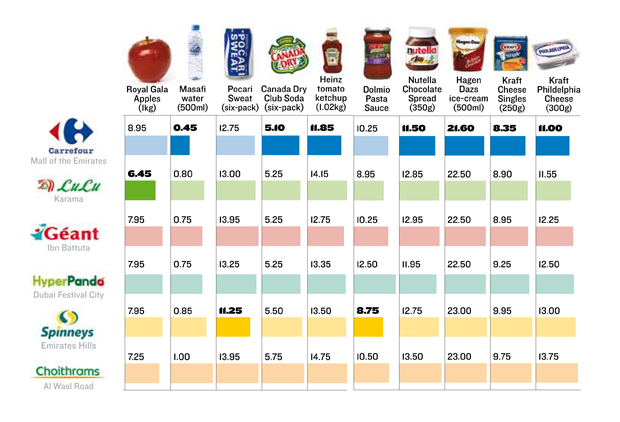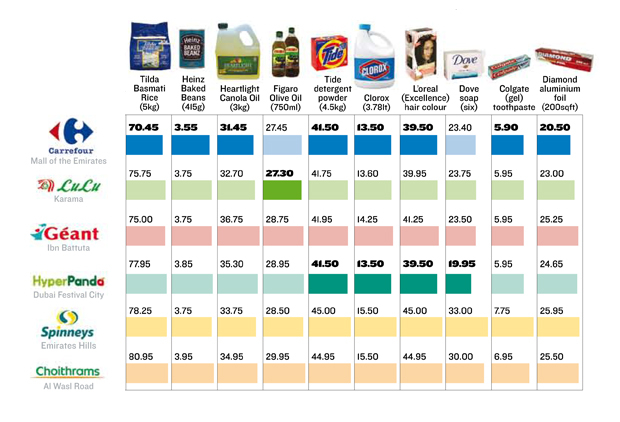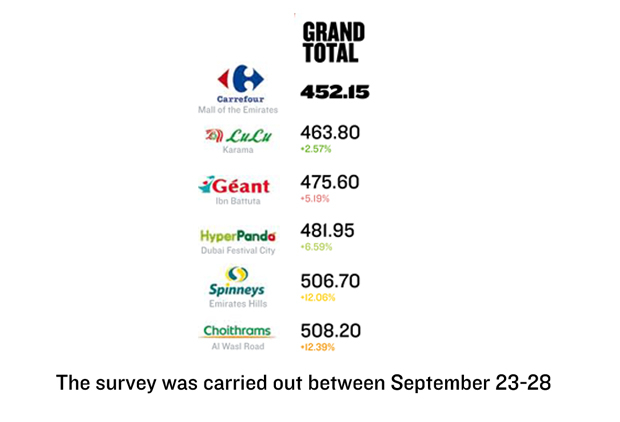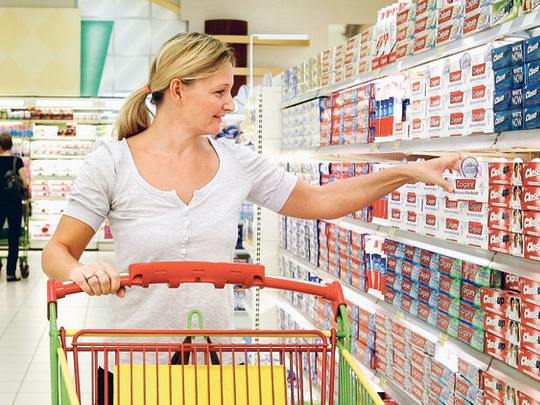
Dubai: Prices of groceries and everyday household consumables in Dubai can vary by up to 12 per cent - or by over Dh50 on a Dh500 bill - from one hypermarket to another, a survey conducted by XPRESS has revealed.
A round of six hypermarkets and supermarkets in the city between September 23-28 indicated that the differences in the price of 30 randomly selected items varied between 2.57 per cent and 12.39 per cent.
The supermarkets covered were Carrefour, Mall of the Emirates; Lulu Hypermarket, Karama; Geant, Ibn Battuta Mall; Hyperpanda, Dubai Festival City; Spinneys, Town Centre, Emirates Hills; and Choithrams, Al Wasl Road. While some argued that pricing is a reflection of the changing dynamics of the supply chain, those at the higher end claimed their prices were competitive, with consumers saying they would pay a premium for quality.
The products selected included groceries, fruits, vegetables, dairy produce, toiletries, cleaning agents and other common household items. Meats were not considered given the vast variation with regard to sourcing and cuts.
With regard to fruit and vegetables, an attempt was made to stick to produce from the same countries in each category. For example: Australian carrots, UAE cucumber, Indian onions, Chiquita banana etc. In some cases, the tendency of consumers to look for products within a particular price range, irrespective of the country of origin, was followed. For example, a consumer wanting potatoes within a range of Dh5 per kg would not be looking at whether they are sourced from Lebanon or Syria.
Listed prices
The prices considered were those listed on the shelves. They were played back to the supermarkets for a reconfirmation. All except Carrefour and Hyperpanda got back, though some were non-committal about the prices.
A comparison of prices indicated that Carrefour, Mall of the Emirates (MoE) and Lulu Karama were at the lower end, while Spinneys in Emirates Hills and Choithrams on Al Wasl Road were at the higher end, with Geant and Hyperpanda placed in between (see table).
The difference in costs of individual items was revealing. For example, three litres of Heart Light Canola Oil at Geant Ibn Battuta was 16.86 per cent costlier than Carrefour. Choithrams, which distributes the product to other supermarkets, had priced it at 11.13 per cent more. Similarly, 1kg of Holland red capsicum in Hyperpanda was 47.2 per cent costlier than in Lulu Karama. And a 500ml bottle of Masafi water at Choithrams was 122.23 per cent more than in Carrefour and 88.89 per cent more at Spinneys.
Sources , however said such comparisons cannot be deemed accurate and can serve only as broad indicators as pricing is dynamic and depends on a host of factors. These factors, as a spokesperson for Spinneys explained, include market prices, production methods, systems and standards, modes of transport (air, sea, land), product types (chilled, frozen or ambient), potential volume sales, wastage, shrinkage, seasonality and limited availability of the products.
V. Nandakumar, Manager, Corporate Communications of the Emke Group, which owns Lulu hypermarkets, said: "We are able to keep our prices competitive because of our huge scale of operations that gives us more negotiating power with suppliers to get better prices, which are passed on to shoppers. Ours is a volume-driven business model operating on low margins."
Competitively priced
This could well be the argument of others like Carrefour, Hyperpanda and Geant, which operate on large scales and volumes. Spinneys and Choithrams claim their prices are competitive. "We work hard to deliver a wide range of products at highest quality, in convenient locations. We ensure efficient service, high levels of food safety and hygiene and price the products competitively," said the Spinneys spokesperson.
Subhash C.K., Retail Marketing Manager, Choithrams, said, "Supply chain dynamics is the key. We stock fresh produce and an air-freighted item would be costlier." In categories other than fruits and vegetables too, he said prices of some products of the same brand differ depending on their source. For example, a baby oil or toothpaste of the same brand sourced from the UK is more expensive than if it is from the Philippines.
For a customer at Choithrams on Jumeirah Beach Road, it is the only store that meets his requirements for Brazilian-cut meats and he is willing to pay more. An Indian couple who shop at Spinneys said, "We would never buy fruits from anywhere other than Spinneys as the quality is far superior."
The Spinneys spokesperson said: "You must consider the fact that we live in a desert and almost 100 per cent of all we eat and drink must be imported."
The spokesperson said products with a short shelf life must be flown in. "We only transport items on passenger flights as we aim to minimise the environmental impact of our transport, the cost of which is more than $2/kg (Dh7.35/kg)."
Ambient or shelf stable items are often brought in by ship containers, the spokesperson added.
But price-conscious customers feel quality of products at Carrefour or Lulu is just as good. "I shop in bulk here as prices are better compared to other hypermarkets," said Michelle Gittings, a shopper at Lulu Al Barsha.
"We believe in quality, both product and service, and (that) does not necessarily mean that we have to charge more," said Lulu's Nandakumar.
Most retail chains fix prices centrally across all stores, though the availability of some products may depend on the areas. Prices are generally changed weekly and with different supermarkets offering different promotions, selling prices are bound to vary, sources said. "We bring down prices as part of our promotions. An upward revision is only allowed when the supplier gets the price amendment ratified by the Ministry of Economy," said Nandakumar, adding that even with produce affected by daily market fluctuations, there is parity as it is directly imported from the source.


